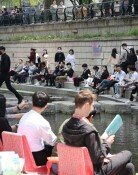Sharing the president`s governing philosphy
Sharing the president`s governing philosphy
Posted March. 13, 2013 06:35,
President Park Geun-hye gave advice to government ministers on nominating the heads of public institutions, saying, "Please strive to nominate people who can share the new government`s philosophy of managing national affairs." The presidential office hinted at a massive reshuffle by saying it will reexamine the professionalism and appropriateness of public CEOs even if their terms have not yet expired. On her predecessor`s practice of preferential appointments at the end of last year, Park as president-elect had said, "This is a huge burden to the public," stressing professionalism as the top principle of appointments. She emphasized professionalism, but was really warning the Lee administration not to make new appointments at the end of its term.
President Park will find it difficult to completely ignore requests from people who helped her get elected. The term "philosophy of managing national affairs" she used is no different from that of the late former President Roh Moo-hyun, who used the term "code" as his appointment principle. Appointing Cabinet ministers and presidential secretaries who share the same governing philosophy with the president is natural. But is it really important for the heads of public institutions and state-owned companies to share the same philosophy with the president? Those who display professionalism and management capability without political color might be more qualified. The main opposition Democratic United Party in a recent commentary warned of the danger of appointments based on preferential treatment and favoritism.
President Park in the past criticized the code and favoritism appointment style of the Roh administration, saying in 2006, "Appointments through favoritism hamper the administration." A year later, she also said, "The (Roh) administration practices ideological and biased code appointments, and has wasted national power by isolating competent people." After being elected, she said, "President Lee`s appointment through favoritism hampers the morale of hardworking public officials." Whether her personnel appointment principle will be maintained remains to be seen.
The presidential transition team had emphasized strengthening systems to remove the political impact on the appointment of public CEOs. It even announced raising the independence of the executive recommendation committee and correcting the maligned system of open selection for public institution heads. If those who helped get President Park elected are appointed to lead public institutions while at the same time saying the open selection system is used, this will be no different from the practices of previous administrations. The open selection system must be complemented to weed out incapable people who were appointed via favoritism.
Many Koreans have grown skeptical over President Park`s personnel principle given her administration`s Cabinet appointments and confirmation hearings. Even if the president`s election supporters cannot be ignored, the losses of state-owned companies must be minimized by strictly examining the capabilities, ethics and professionalism of appointees. The Park administration should not repeat its predecessor`s mistakes of appointing public CEOs based on favoritism, a practice reviled by labor. The key is to not make appointments just because candidates share the same philosophy with the president.







